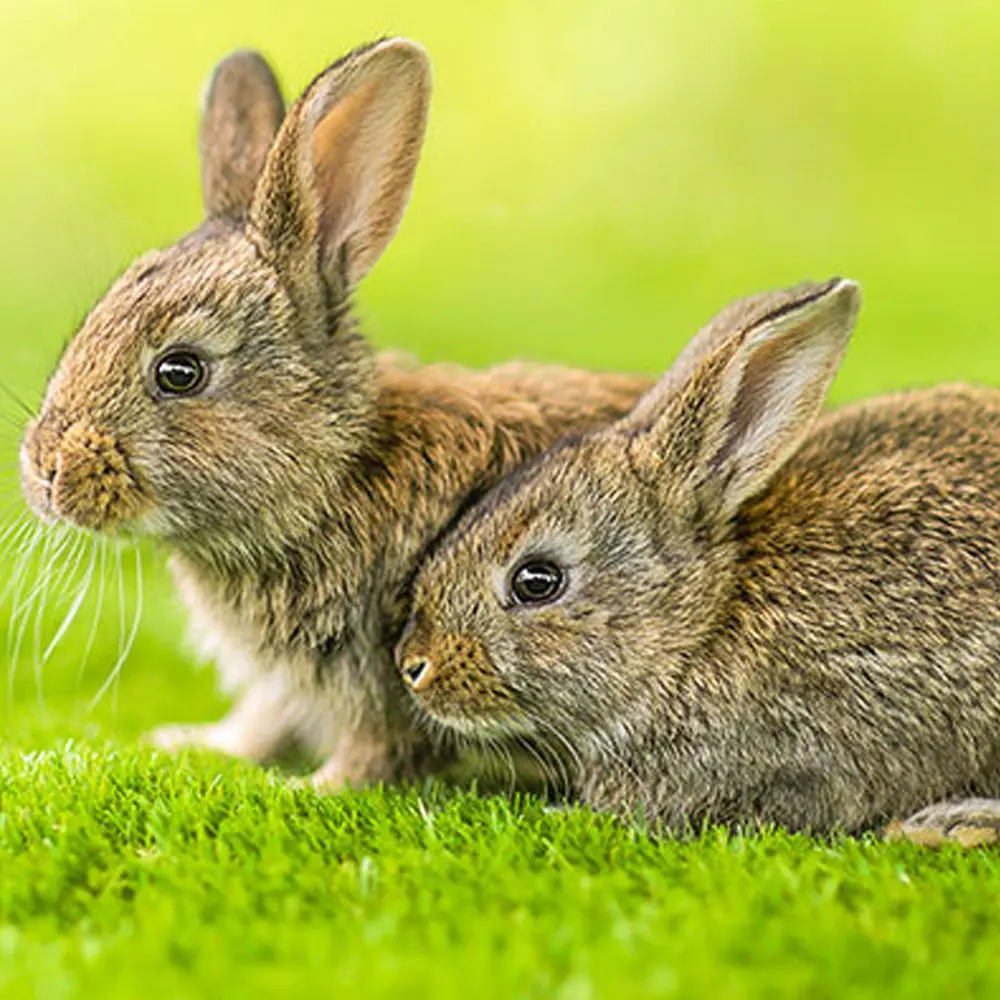Rabbits’ unique ears are a key part of their charm, but have you thought about the complexity of rabbit ear health? Did you know that rabbit ear infections are a common problem? The signs can be subtle, but ear issues are known to cause pain and have been shown to reduce binkying behaviour and quality of life for our fluffy friends.
In this blog we’ll take a look at how you can spot the signs of ear disease, some common causes of bunny ear infections, and steps you can take to keep your rabbits’ ears healthy.
What are the signs of ear disease in rabbits?
Signs of ear disease in rabbits can be very variable depending on the type of ear disease, its severity and the individual rabbit.
Rabbit ear infection symptoms include:
- Head shaking
- Ear scratching or overgrooming
- Discharge from the ears
- Crusting around the ears
- Swelling at the base of the ear
- Reaction to touching the ears
- Behavioural changes (e.g. increased affection, grumpiness, reduced binkying)
- Reduced appetite
- Head tilt
- Facial asymmetry
- Reduced hearing
The signs you might see depend on the type of ear infection your rabbit has. For some ear infections, symptoms can be minimal or even absent. However, ear disease can worsen if left untreated, so it’s important to see a vet if you think your rabbit is showing any sign of ear disease.
Which rabbits are at risk of an ear infection?
Many factors are involved in the development of ear disease in rabbits, and any rabbit can be affected. It’s also important to note that some rabbits can have ear disease without an infectious cause, due to excess wax, for example.
Rabbits with lop ears, including lop-eared breeds like the Dwarf Lop and English Lop, are at significantly higher risk of infection than rabbits with upright ears. In the standard ear, three pieces of cartilage interlock to hold the ear up. In lop-eared rabbits, there’s a gap between two of these cartilages that allows the ear to fold over and effectively close off the ear canal.
Just like humans, rabbits produce constant low levels of ear wax to keep their ears clean and healthy, but this system relies on the wax migrating out of the ear successfully. In lop-eared bunnies, the wax often becomes trapped and accumulates. This can result in swelling at the base of the ear, inflammation and infection.
Other risk factors for rabbit ear infections include age, with older rabbits potentially having slightly higher risk, respiratory tract infections and even dental disease. In the case of ear mites, exposure to either an infected rabbit or items that have been in close contact with one is also important.
What actually causes a rabbit ear infection?
Mites are a common cause of rabbit ear infections and typically cause itchiness, scratching, head shaking, discharge and crusting around the outside of the ear canal. These are contagious and can easily spread from rabbit to rabbit, either directly or on objects like clothing.
In lop-eared rabbits, accumulation of excess wax is a relatively common cause of ear disease, but this built-up wax often also allows secondary infections to develop.
Rabbit ear infections are usually caused by bacteria and/or yeast and may affect just the outer part of the ear or the middle part too. Infections that affect the middle ear may cause symptoms like a head tilt, facial asymmetry or poor balance.
Ear infections caused by respiratory or dental disease typically affect the middle ear, so signs like scratching and discharge are less common. Some rabbits may not show any signs at all.
Occasionally, rabbit ear infections or ear disease can be due to other causes, including foreign objects like grass seeds, trauma, or, rarely, a growth affecting the ear canal.
How to prevent a rabbit ear infection
Regular veterinary health checks are important for all rabbits and can help to ensure the early signs of a bunny’s ear infection aren’t missed. If you suspect an ear infection, it’s important to see your vet as soon as possible.
Doing your best to avoid exposure to mites is one important step to minimise the risk of infection, but what else can you do? Using a rabbit ear cleaner can also help to prevent bunny ear infections.
If you’ve been told your rabbit has excess wax or you think they could benefit from a rabbit ear cleaner, you may be wondering where to start. Cleaning rabbit ears doesn’t have to be daunting, but there are a few tips and tricks to get it right.
- Pick a high-quality rabbit ear cleaner
It’s important to use an ear cleaner that’s been proved to be safe in rabbits’ delicate ears. Other things to look out for include a comfortable applicator, gentle formulation and antibacterial ingredients to help keep your rabbit’s ears healthy. Omniotic, our gentle antibacterial ear cleaner, is tried and trusted by vets to help keep rabbits’ ears clean.
2. How to clean their ears
How do you go about cleaning rabbit ears? Position your rabbit in a sitting position with their head in a neutral position. Gently lift your bunny’s ears one at a time so you can see the entrance to their ear canal, and fill this with cleaner. Massage around the base of the ear gently for 30-60 seconds before wiping any excess out with some cotton wool.
3. How often should you use a rabbit ear cleaner?
Cleaning rabbit ears can help to clear excess wax and reduce the risk of infection, but you don’t want to overdo it. If your vet has diagnosed an ear issue, they may recommend cleaning daily. For more routine cleaning, weekly or fortnightly use can help to prevent bunny ear infections and keep their ears clean and healthy.
Keen to start cleaning your rabbits’ ears? Check out our rabbit-safe, tried and tested advanced ear cleaner, Omniotic. Suitable for routine cleaning, the gentle but effective formula can help to keep your rabbits’ ears clean and clear and stop ear infections before they begin.
Find more pet advice here…





0 Comments